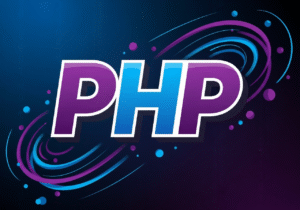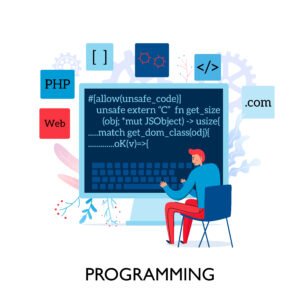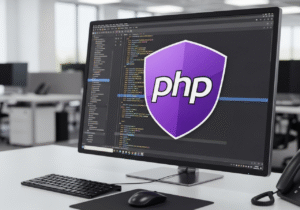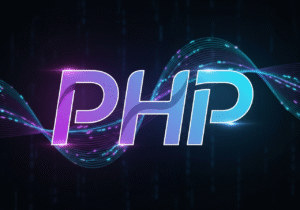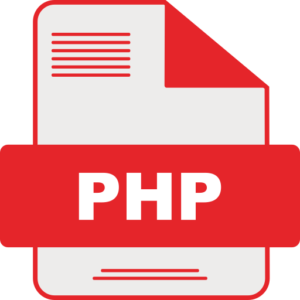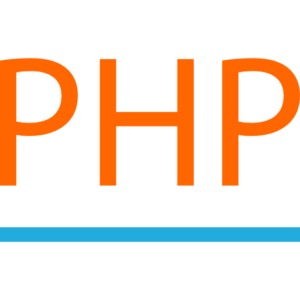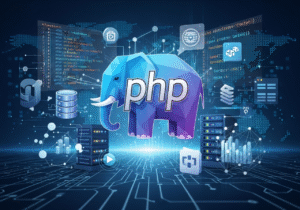Overview of popular PHP frameworks (Laravel, Symfony, CodeIgniter, etc.)
In PHP programming, you have several popular PHP framework choices, including primarily Laravel, Symfony, CodeIgniter, Yii, Zend, Laminas, and Falcon, which we will explore in detail. We will focus on the features, strengths, and general web development uses of these popular frameworks. Each framework has its own unique functions and features that make them useful for different types of projects in multiple universal purpose web development.

Introduction to Laravel PHP Framework.
Today, Laravel is the most popular and modern PHP framework foundation for PHP web development. The Laravel PHP development framework is popular for its unique programming syntax, developer-friendly environment features, and rich ecosystem. The Laravel framework is used on a large scale for web application development, from small to large web development projects.
Main Features of the Laravel PHP Framework.
- MVC Architecture – The Laravel framework follows the Model-View-Controller pattern, which helps in dealing with tasks in multiple overviews in PHP web development.
- Eloquent ORM – The Laravel framework has its own Object-Relational Mapper for backend database software table record interaction, which helps web developers interact with the database software by following PHP syntax.
- Blade Templating Engine – This is a powerful, lightweight templating engine in the Laravel framework.
- Routing – This is a clear, expressive, and easy-to-use routing system in the Laravel framework.
- Authentication and Authorization – This is a built-in support feature in the Laravel framework for user authentication and role-based access control.
- Artisan CLI – This is a command-line interface environment in the Laravel framework that provides several helpful commands for web development. For example, database migration, testing, etc.
- Background Jobs – This provides built-in support for task scheduling and background processing in web development processes within the Laravel framework.
- Migrations and Seeders – This is for database versioning and seeding activities in the Laravel framework, making it easy to manage web databases in web development and production.
- Ecosystem – The Laravel framework includes many built-in packages and services such as Laravel, Forge, Nova, Passport, and Envoyer.
Why use the Laravel PHP framework?
- Fast Development – The Laravel PHP framework is the best framework for web developers who want to quickly develop a full-fledged web app or development due to its many built-in features, functions, and tools.
- Developer Experience – The Laravel framework provides a very clear, readable, and advanced coding development environment.
- Community and Ecosystem – The Laravel web development framework has a very large developer community and a rich ecosystem of tools and services.
- Best for – The Laravel framework is best for application development where developers want fast development, scalability, and strong features. Such as SaaS applications, e-commerce development, and custom user APIs.
Popular projects built with the Laravel PHP framework.
- Startups and SaaS – For top-level web development or app creation, multinational companies often select the Laravel framework to quickly build MVPs (Minimum Viable Products).
- E-commerce Sites – The Laravel framework provides developers with packages like Laravel Cashier and Laravel Spark, which help web developers with subscription billing and SaaS application design and development.
Introduction to Symfony PHP Framework.
For easy and complex web development or app design, the Symfony PHP framework is a mature and flexible PHP development environment. The Symfony PHP framework is popular for its development scalability and strength. It is mostly used in the design and development of large-scale, complex enterprise applications, and can also be used as a set of reusable components in other frameworks.
Key Features of the Symfony PHP Framework.
- Reusable Components – The Symfony PHP framework provides developers with a set of ready-made, reusable PHP web components that can be easily integrated into any other PHP framework or used for various universal web development purposes.
- Flexibility – Compared to other frameworks, the Symfony PHP framework provides a highly customizable and configurable software environment with a more complex design and development structure.
- Twig Templating Engine – The Symfony PHP framework uses Twig as its default templating engine, which provides a fast and secure templating system.
- Doctrine ORM – The Symfony PHP framework uses Doctrine for database abstraction, providing developers with powerful query creation features.
- Event Dispatcher – The Symfony PHP framework is compatible with a robust event-handling system, which helps in separating web application logic.
- Console and CLI Tools – The Symfony PHP framework provides powerful command-line tools for tasks such as web application or website database migration and creating custom commands.
- Testing – The Symfony PHP framework provides built-in tools and features for unit testing, functional testing, and integration testing.
- Security – The Symfony PHP web development framework has strong security features, including built-in user authentication, password hashing, and access control features for developers.
Why use Symfony?
- Enterprise-grade applications – The Symfony PHP framework provides an ideal development environment for large-scale, enterprise-level development projects where flexibility and scalability are important for developers when developing web applications.
- Component-based – The modularity approach of the Symfony PHP framework makes it useful in other popular PHP frameworks or as standalone components.
- Learning curve – The Symfony PHP framework has a slightly complex learning curve, but it provides developers with more control over the architecture of the developed application.
- Best for – The Symfony PHP framework is best for developers who need detailed control over the architecture and infrastructure in the development of large, complex web applications, such as large e-commerce websites, enterprise applications, and custom user software APIs.
Popular projects built with Symfony.
- Drupal – The Drupal 8+ CMS framework is developed using Symfony components.
- Magento 2 – This is also a popular PHP framework that helps in designing and developing large-scale e-commerce platforms, which uses Symfony PHP framework components.
- PHPBB – This is also a popular forum software that uses Symfony PHP framework components.
Introduction to CodeIgniter PHP Framework.
CodeIgniter PHP framework is a lightweight and simple web application development design framework that is easy to configure, set up, and use on any server. It is designed and developed for web software developers who want a basic, simple, yet powerful web development framework without the complexity of large-scale web application frameworks.
Key Features of CodeIgniter PHP Framework.
- MVC Architecture – Like other popular PHP frameworks, the CodeIgniter PHP framework follows the Model-View-Controller architecture concept.
- Lightweight – The CodeIgniter PHP framework is best known for its small size and minimal hardware configuration requirements.
- Database Abstraction – The CodeIgniter PHP framework includes a lightweight database abstraction layer to interact directly with the backend user database.
- Routing – The CodeIgniter PHP framework follows a simple, flexible routing system.
- Security – The CodeIgniter PHP framework comes with built-in security authentication features to protect against SQL injection, XSS, and CSRF attacks.
- No CLI Required – The CodeIgniter PHP framework does not require the use of a command-line interface, making it compatible for beginner web developers or users, or those who prefer simplicity in development.
Why use the CodeIgniter PHP Framework?
- Speed - Due to its minimal requirements and small file size, the CodeIgniter PHP framework is much faster than other popular PHP frameworks.
- Ease of Use – It is simple and well-documented, making it a perfect development option for beginner developers or users, or for rapid prototyping.
- Low Overhead – The CodeIgniter PHP framework is the best choice for small to medium-sized web application development.
- Best for – The CodeIgniter PHP framework is good for small applications or projects where simplicity and speed are a priority for the developer. For example, small client websites, popular blogs, or an admin panel in a dashboard.
Popular projects built with the CodeIgniter PHP Framework.
- UserFrosting – A popular user management system built on the CodeIgniter PHP framework.
- Cashu – A simple accounting and budgeting app software built using the CodeIgniter PHP framework.
Introduction to Yii PHP Framework.
The Yii PHP framework is a high-performance, ready-made component-based popular PHP web development framework that is easy to install and configure on client and server machines. The Yii PHP framework is popular for its speed and robust features for complex web application development.
Key Features of the Yii PHP Framework.
- High Performance – The Yii PHP framework is optimized for high development performance and is one of the fastest PHP frameworks available in PHP web development.
- Gii Code Generator – The Yii PHP framework provides developers with a built-in code generator (Gii) feature that can automatically generate CRUD operations, models, controllers, and other components according to web development needs.
- ActiveRecord – The Yii PHP framework provides developers with built-in support for ActiveRecord (a design pattern for database interaction).
- RBAC – This PHP framework provides built-in features for Role-Based Access Control.
- Security – This PHP framework provides built-in support for data validation, input filtering, and security against XSS and SQL injection attacks.
- Testing – This PHP framework provides support for unit testing, which is essential for maintaining large-scale software codebases.
- Routing – This PHP framework provides developers with a flexible and powerful URL routing system.
Why use the Yii PHP Framework?
- Yii PHP framework – The Yii PHP framework is the best choice for high-performance web and application development, especially when the application needs to deal with large amounts of data.
- Fast Development – With Gii and other tools in the Yii PHP framework, developers can quickly generate boilerplate code and source code as needed, and speed up their web application development process.
- Best for – Large-scale web application development, especially when designing and developing data-intensive applications such as Enterprise Resource Planning systems and Content Management Systems.
Popular projects built with the Yii PHP Framework.
- humhub – This is a social networking platform built on the Yii PHP framework.
- Wiwigo – A photo gallery platform, built using the Yii PHP framework.
Introduction to Zend Framework (Laminas).
Zend PHP framework is a popular web application development framework, now known as Laminas. The Zend PHP framework (Laminas) is a strong, enterprise-focused PHP framework. It is designed and developed for web software developers who need to create complex, scalable web applications and essential services for themselves or their clients.
Key features of Zend Framework (Laminas).
- Modular – The Zend PHP framework provides a set of loosely-coupled, reusable design components that can be used in other frameworks or projects.
- High Customizability – The Zend PHP framework provides a high level of flexibility and developer control, making it the best choice for complex, custom-developed applications.
- MVC Architecture – The Zend PHP framework follows the MVC pattern concept and provides flexible routing and configuration options.
- Service Manager – The Zend PHP framework provides powerful dependency injection container features for managing your application services.
- Security – The Zend PHP framework provides built-in tools for authentication, authorization, and CSRF security.
- Testing – The Zend PHP framework provides developers with comprehensive testing tools and integration with PHPUnit for unit testing.
Why use Zend Framework (Laminas)?
- Enterprise-grade solution – The Zend PHP framework is an ideal environment for large-scale, complex enterprise applications that require a high level of customization and control over application development.
- Component Reusability – This is a great feature if developers want to use individual components rather than the entire framework.
- Best for – The Zend PHP framework is suitable where developers need to build complex and enterprise-level applications, microservices, and APIs that require advanced customization.
Popular projects built with Zend Framework (Laminas).
- Magento 2 – This uses components of the Zend PHP framework.
- ZF2 – This uses the Zend PHP framework in the construction of high-performance applications.
Introduction to Phalcon PHP framework.
Phalcon is also a popular PHP framework. It is distributed as a C programming extension, which makes the Phalcon PHP framework extremely fast in terms of performance. If a developer needs to design and develop a high-performance application, this is an excellent choice.
Key features of the Phalcon PHP framework.
- High Performance – The Phalcon PHP framework has become one of the fastest PHP frameworks due to being written in the C language as a PHP extension.
- MVC Architecture – The Phalcon PHP framework is developed on the standard MVC pattern.
- ORM – The Phalcon PHP framework provides a powerful Object-Relational Mapper for interacting with databases.
- Caching – The Phalcon PHP framework has built-in support for multiple caching mechanisms, such as memory caching and file caching.
- Security – Built-in security features are included to protect against attacks from SQL injection, XSS, and CSRF.
- CLI Tools – The Phalcon PHP framework provides command-line tools to speed up the development process.
Why use the Phalcon PHP framework?
- Performance – If development performance is a high priority for the developer, the Phalcon PHP framework provides extremely fast speeds due to its C language extension.
- Great for Large -Scale Apps – The Phalcon PHP framework is best for applications that require high performance and scalability.
- Best for – The Phalcon PHP framework is ideal for high-performance applications, especially those that expect a large volume of traffic, such as social networks, e-commerce platforms, etc.
Popular projects built with the Phalcon PHP framework.
- Baidu – It uses the Phalcon framework for a part of its architecture.
- High-speed processing services – Any web service requiring fast performance benefits from the Phalcon PHP framework.
Conclusion on PHP frameworks Laravel, Symfony, CodeIgniter.
- Every PHP web development framework has its own strengths and weaknesses, and choosing the right PHP web development framework for each developer depends on the needs of your project.
- The Laravel PHP framework is perfect for rapid web app development, modern applications, and when you want a strong, feature-rich framework.
- The Symfony PHP framework is an ideal framework for developing large, complex applications that focus on scalability and flexibility.
- The CodeIgniter PHP framework is the best choice for small PHP development projects and for users who need a lightweight framework.
- The Yii PHP framework is fast and flexible, and is the most suitable framework for large-scale applications requiring high performance.
- The Zend PHP framework is a great framework for large industry enterprise-level, highly customizable applications.
- If the developer needs high-performance development and the programmer is developing a high-traffic application, then the Phalcon PHP framework is an excellent choice.


